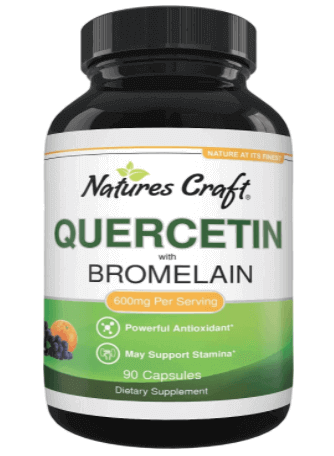
When it comes to natural products to treat hair loss, I am a skeptic insofar as believing that such products can regrow hair on bald scalps. However, I do trust many of the studies that find natural products to be able to increase overall hair thickness and reduce the rate of hair fall.
Ultimately, if natural products and herbs can make existing hair thicker and prolong the anagen phase of the hair growth cycle, they can be a great tool when used in the initial stages of hair loss. Perhaps dihydrotestosterone (DHT) spurred follicle miniaturization can get delayed for a few years?
The latest such herbal remedy that is in the news is Quercetin (sometimes termed Que or Qu), a plant flavanoid and antioxidant. Flavonoids are phytochemical polyphenol compounds present in many plants, fruits, vegetables and leaves. Note that some studies use the name Quercitrin, which is a glycoside formed from quercetin.
Quercetin and Hair Regeneration
Yesterday, a reader named “Daniel” messaged me on Twitter and sent a link to the following conversation that was started by well known health coach P.D. Mangan:
https://twitter.com/Mangan150/status/1670863218238169088
- Mr. Mangan is referring to a new June 7, 2023 study from China that finds a potent role for quercetin in promoting hair regeneration. The researchers found that in mice hair follicles, topical quercetin treatment stimulates the:
“Differentiation trajectory and induces an angiogenic signature in dermal endothelial cells by activating HIF-1α. Skin administration of a HIF-1α agonist partially recapitulates the pro-angiogenesis and hair-growing effects of Que.”
- Also of note, a December 2022 mice study from China (published this month) presents a combination therapy for androgenic alopecia that includes quercetin. It is based on a quercetin and zinc/copper dual-doped mesoporous silica nanocomposite microneedle patch. They call it ZCQ/MN (Zinc, Copper, Quercetin, Microneedle). Per the paper, zinc and copper are weak inhibitors of 5α-reductase.
Quercitrin and Hair Growth
Another South Korean study from 2020 found that quercitrin stimulates hair growth due to the enhanced expression of growth factors via activation of the MAPK/CREB signaling pathway. This study was done on cultured human dermal papilla cells (hDPCs).
Among the key findings:
- Quercitrin stimulated the mitochondrial energy metabolism and enhanced proliferative capacity.
- It increased the production of growth factors bFGF, KGF, PDGF-AA, and VEGF, which are essential for hair growth.
- The expression of Bcl2 and Ki67, key markers for cell survival and anagen extension, was also increased.
- Cell signal transduction elements (such as Akt, Erk, CREB and several receptor tyrosine kinases) were found to be stimulated by quercitrin.
- Finally, quercitrin enhanced the hair shaft growth in cultured human hair follicles.
The scientists conclude that quercitrin holds therapeutic potential for preventing and/or treating hair loss.
Quercetin for Health and Longevity
Normally, I would not write this post in spite of the above studies. There are just way too many natural and herbal remedies that benefit mice hair in some manner or other.
However, quercetin has been in the news a lot recently due to its overall health benefits. The number of health benefits of quercetin that are listed on the Mount Sinai site are hard to believe, but the site is reputable. Among these benefits include an improvement in cholesterol, blood pressure and overall heart health.
Quercetin’s flavonoid and antioxidant properties enable it to scavenge and neutralize free radicals in the body. The latter can damage cell membranes, tamper with DNA and even cause cell death. Flavonoids also have cancer fighting properties.
The renowned Dr. David Sinclair (of NAD, NMN and Resveratrol fame) takes a quercetin supplement daily:
Foods that are high in quercetin include onions, apples, tea, grapes, berries, cherries. Quercetin supplements are available as pills or capsules and are often packaged with bromelain (an anti-inflammatory enzyme found in pineapples).
Side effects from these supplements are rare, although one should not take excessively high doses. Anything above 1000 mg per day can potentially cause kidney damage.
Many longevity doctors no longer believe in the benefits of Q. Dr Sinclair ( Harvard ) from the video pushes a ton of suspect supplements whose benefits have been debunked.
True, but the benefits of Quercetin are touted all over the place, including on the Mount Sinai site I mentioned. I never take supplements other than Vitamin D in winter, but might consider some in the near future.
https://www.ncbi.nlm.nih.gov/pmc/articles/PMC9032170/
Actually the quercetin supplement has not been proven to have the anti-aging benefit that they were once suspected of having. It is possible that they do contain some benefit but the jury is still out. There is a pretty healthy debate going on as we speak about this very subject amongst the anti ageing health field.
The HIF angle has been trialed wrt aga for a loooong time, but consistently fails in Vivo (humans). Iirc shikimic acid had a study done on ex-vivo human hfs/skin with good results, published in nature in 2019 but ultimately failed. I know news are slow but pls refrain from mice studies – they are tempting but let’s be honest, their translation to humans is total bs .
Absolutely !!!
What is HIF?
https://news.uci.edu/2023/06/21/uc-irvine-led-researchers-reveal-new-molecular-mechanism-for-stimulating-hair-growth/
Thanks. Two people also e-mailed me about this. Post published.